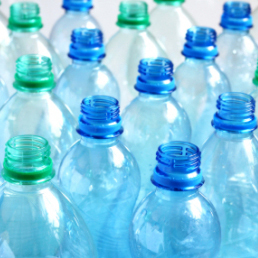Plastic Softener Found in Lining of Canned Food, Baby Bottles, Linked to Sexual Health Problems in Humans
by
Brendon Nafziger, DOTmed News Associate Editor | November 16, 2009

Heightened health concerns
over plastics exposure
One of the first studies to look at the effects of bisphenol-A (BPA), a chemical used to soften some plastics, on humans could confirm fears that it affects male sexual health.
According to a recent issue of the journal Human Reproduction, male Chinese workers exposed to high on-the-job levels of BPA were more likely to report impotency and sexual dysfunction.
Found in baby bottles, plastic containers, shower curtains and the resin lining of food cans, BPA has been known to be an endocrine disruptor since the 1930s. It's thought to work by mimicking the female sex hormone estrogen, thereby possibly blocking the processing of male hormones.
In some (but not all) animal studies, mostly on rats, BPA has been shown to affect male sex organ development and hormone levels. Yet, because of the physiological differences in how rats and humans metabolize BPA - humans rapidly convert ingested BPA into a non-hormonally active form - most health agencies, such as the FDA and the European Food Safety Authority, believe current exposure levels are safe, though Canada recently banned it from baby bottles.
In this study, the researchers, from the Kaiser Foundation Research Institute in Oakland, Calif., surveyed laborers who worked at four factories in China with unusually high concentrations of BPA: one shop that actually made BPA and three others that manufactured epoxy resin, with the plastic softener as one of its raw ingredients.
As a control, the researchers canvassed men working at factories in the same region where there was no BPA exposure on the floor, and they also surveyed husbands of women who worked at the high-BPA factories.
"The risk [of sexual dysfunction] was four to seven times higher in the exposed workers," De-Kun Li, M.D., Ph.D., lead author and a senior research scientist at the Kaiser Research Institute, tells DOTmed News. Men who had had high workplace exposure were around four times more likely to have difficulty maintaining an erection, and about seven times more likely to have trouble ejaculating, than others who toiled at low-BPA factories or husbands of workers at high-BPA factories.
The researchers also found what's known as a dose-response relationship, a useful tool in proving a toxic effect: they discovered that with greater exposure to BPA at work - that is, the longer a worker worked at a factory with higher BPA levels - the worse their sexual dysfunction, with sexual ability declining after only one year of workplace exposure.
Still, the authors caution that these workers were receiving unusually high levels of BPA, much greater than would be had in normal environments, so it's not clear how well the results will apply to the world outside BPA-filled factories, where exposure is quite low.
But caution, Dr. Li believes, should be exercised both ways. "While waiting for future studies to determine the BPA effect at lower doses, one can take measures to avoid BPA as much as one can," he argues. "It is called prudent avoidance."
